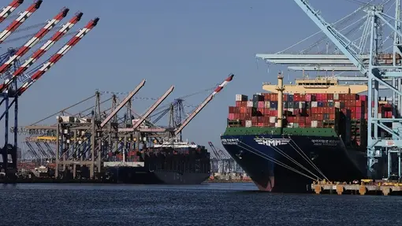 |
| An oil tanker near the port city of Nakhodka, Russia. (Source: Reuters) |
Sanctions work
A year since Russia began its military campaign in Ukraine, the West has imposed a series of sanctions , causing its biggest customers (such as countries in Europe) to turn their backs on Moscow's crude, the International Energy Agency (IEA) said.
In December 2022, the European Union (EU), the Group of Seven (G7) and Australia began imposing a price ceiling on seaborne Russian crude oil imports at $60 per barrel.
They then followed up with new sanctions, banning nearly all imports of Russian oil products and imposing price caps on diesel and other oil products from Moscow. The ban took effect on February 5.
These sanctions are aimed at ensuring that Russian oil continues to flow, keeping global markets stable, while also restricting Moscow's revenue from oil exports to fund its special military campaign in Ukraine.
Citing the Russian Finance Ministry , the IEA said that Russia's oil export revenues have nearly halved compared to a year ago, while its oil exports have remained virtually unchanged. This shows that Western sanctions are having an effect. Moscow's revenues have fallen and global oil flows have not been affected.
Not only that, Russian tankers are forced to make longer journeys to Asia - where new customers are trying to buy oil.
In February 2023, Russia's oil exports fell by 500,000 barrels to 7.5 million barrels per day, as diesel and other refined oil products were massively withdrawn from Russia before the sanctions took effect.
The country's oil revenue also fell to $11.6 billion, $2.7 billion less than in January 2023, the IEA said.
“The Western sanctions regime has been effective in limiting Russia’s ability to generate export revenue without disrupting global oil flows,” the agency asserted.
Russian oil "knocks on Africa's door"
After sanctions were imposed on Russia, the country shifted its crude oil exports to China and India, disrupting global oil flows and the maritime industry. To "replace" Europe, Russia not only aggressively sold oil to Asia but also "knocked on the door" of the North and West African markets.
One of the most popular new destinations for Russian oil is Morocco. In January 2023, Morocco imported 2 million barrels of diesel from Russia, more than triple the 600,000 barrels in 2021. The volume of diesel fuel that Morocco bought from Russia in February 2023 is expected to reach more than 1.2 million barrels.
Tunisia, which imported almost no Russian petroleum products in 2021, has in recent months bought large amounts of diesel, kerosene, gasoline and naphtha - a petroleum product used to make chemicals or plastics.
In January 2023, Tunisia imported 2.8 million barrels of various petroleum products from Russia and is expected to import about 3.1 million barrels in February 2023.
West Africa is also increasing its purchases of Russian oil. According to a trade source, Senegal received five cargoes of Russian oil in February 2023 at its main port. Some of the products are being supplied by Litasco, the trading arm of Geneva-based Lukoil, which has been operating in the West African market for more than 20 years.
Litasco is also supplying Russian oil and gas to Ghana, but is paid in gold, not cash.
Similarly, Algeria and Egypt are also increasing their purchases of Russian oil products, but the exact figures are not disclosed. Russia is said to be replacing these countries' traditional suppliers in the Middle East and North America.
However, experts believe that it is possible that Russian oil products sold to African countries will return to Europe in many ways. Expert Viktor Katona from the analysis firm Kpler revealed that the amount of oil products that North African countries import from Russia is too large, exceeding their needs.
Financial Times 'reveals' information that the US Treasury encourages buying Russian oil The Financial Times (FT) on March 10 quoted sources saying that representatives of the US Treasury Department met with heads of ... |
Moving Away from Russia, Europe Relies on the Middle East; Moscow Oil Takes a Detour to Buyers A year since Russia launched a special military operation in Ukraine, the oil market has become uncertain... |
India complies with Russian oil price ceiling, US satisfied with New Delhi on one issue On March 12, Bloomberg reported that the Indian government has decided not to violate Western sanctions imposed on... |
China, India compete to buy Russian oil due to low prices China's private refiners are competing with Indian rivals for mixed oil volumes... |
Russian oil is about to be shipped to a South Asian country, selling price is only 50 USD/barrel Pakistan is looking to buy Russian oil at $50 a barrel, as the South Asian nation grapples with a ... |
Source










![[Photo] Party and State leaders attend the special art program "You are Ho Chi Minh"](https://vphoto.vietnam.vn/thumb/1200x675/vietnam/resource/IMAGE/2025/5/18/6895913f94fd4c51aa4564ab14c3f250)
![[Photo] Many young people patiently lined up under the hot sun to receive a special supplement from Nhan Dan Newspaper.](https://vphoto.vietnam.vn/thumb/1200x675/vietnam/resource/IMAGE/2025/5/18/6f19d322f9364f0ebb6fbfe9377842d3)
![[Photo] Ready for the top competitions of Vietnamese table tennis](https://vphoto.vietnam.vn/thumb/1200x675/vietnam/resource/IMAGE/2025/5/18/9c547c497c5a4ade8f98c8e7d44f5a41)




















































































Comment (0)